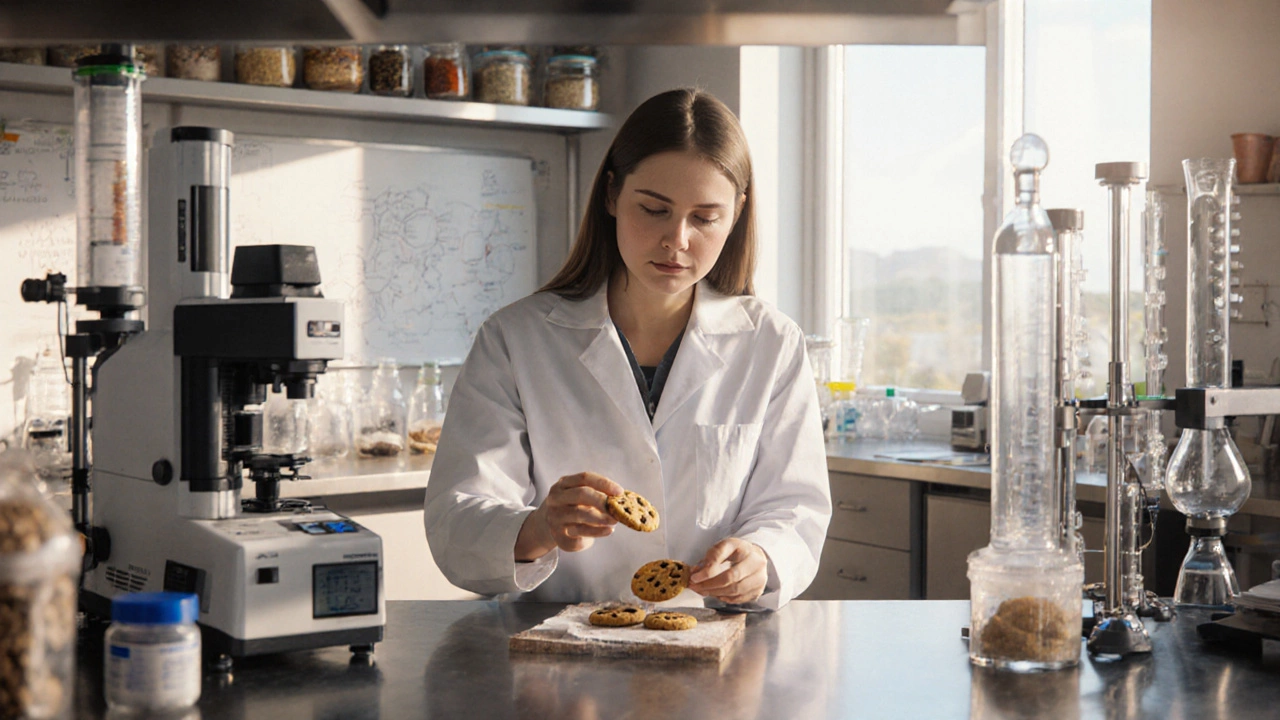Food Scientist Job Title Explorer
Explore the diverse world of food science careers. Click on any title below to learn more about its responsibilities, typical employers, and required qualifications.
Food Scientist
Product development & quality assurance
Food Technologist
Scale-up & process optimization
Nutritionist
Nutrition analysis & labeling
Sensory Scientist
Consumer sensory testing
Flavor Chemist
Flavor creation & formulation
Food Safety Specialist
Hygiene audits & HACCP implementation
Typical Employer
Core Focus
Common Degree
Ever opened a grocery store or a lab and wondered who decides why that cookie stays crisp or how a low‑fat cheese still melts? That behind‑the‑scenes brain is called a food scientist, though the exact job title can vary widely.
Key Takeaways
- A food scientist is a professional who applies science to improve food quality, safety, and innovation.
- Common alternative titles include food technologist, sensory scientist, flavor chemist, and food safety specialist.
- Typical duties range from product development to safety testing and regulatory compliance.
- Entry paths usually start with a degree in food science, chemistry, nutrition, or related fields.
- Salary and demand are strong, especially in consumer packaged goods and restaurant chains.
What Is a Food Scientist?
If you’re looking for a career that blends chemistry, biology, and a love for food, consider becoming a food scientist. In simple terms, a Food Scientist is a professional who uses scientific principles to develop, analyze, and improve food products and processes. They work in labs, manufacturing plants, and sometimes even test kitchens, ensuring that what ends up on the shelf is tasty, safe, and cost‑effective.
Alternative Job Titles You Might Hear
The food industry loves creative naming, so the role of a food scientist often appears under different banners. Below are the most common equivalents, each defined with its own focus.
Food Technologist is a specialist who applies engineering and scientific methods to transform raw ingredients into finished food products. They often handle scaling recipes from pilot to full production.
Nutritionist is an expert who evaluates the nutritional content of foods and designs products that meet dietary guidelines. Their work is crucial for health‑focused brands.
Sensory Scientist studies how consumers perceive taste, texture, aroma, and appearance, turning subjective feedback into data‑driven product tweaks.
Food Engineer focuses on the design and optimization of processing equipment, packaging, and supply‑chain logistics.
Flavor Chemist creates and balances flavor compounds, ensuring that every bite delivers the desired taste experience.
Food Safety Specialist monitors hygiene standards, conducts hazard analyses, and implements corrective actions to keep products free from contamination.
R&D Scientist (Food) leads research projects aimed at breakthrough ingredients, novel processing techniques, or sustainable packaging solutions.

Core Responsibilities Across Titles
- Design and test new recipes or formulations.
- Conduct laboratory analyses for nutrition, microbiology, and sensory attributes.
- Ensure compliance with local and international food regulations (e.g., FDA, EFSA).
- Collaborate with marketing, packaging, and supply‑chain teams to bring products to market.
- Monitor shelf‑life stability and troubleshoot quality issues.
How to Become a Food Scientist (or One of Its Variants)
- Earn a relevant bachelor’s degree. Common majors include Food Science, Chemistry, Biology, Nutrition, or Agricultural Engineering.
- Gain hands‑on experience. Internships in food manufacturers, research labs, or government agencies provide practical skills.
- Consider specialization. A master’s or PhD can open doors to senior R&D roles, academic positions, or niche areas like flavor chemistry.
- Get certified. Certifications such as the Institute of Food Technologists (IFT) Certified Food Scientist (CFS) add credibility.
- Build a professional network. Attend industry conferences (e.g., Food & Nutrition Conference) and join online forums.
Comparison of Common Food‑Science Job Titles
| Job Title | Typical Employer | Core Focus | Common Degree |
|---|---|---|---|
| Food Scientist | Consumer packaged goods (CPG) companies | Product development & quality assurance | BSc Food Science |
| Food Technologist | Food processors & manufacturers | Scale‑up & process optimization | BSc Food Technology |
| Nutritionist | Health brands, NGOs, government | Nutrition analysis & labeling | BSc Nutrition |
| Sensory Scientist | R&D labs, market research firms | Consumer sensory testing | BSc Psychology or Food Science |
| Flavor Chemist | Flavor houses, large food brands | Flavor creation & formulation | MSc Chemistry |
| Food Safety Specialist | Regulatory agencies, manufacturers | Hygiene audits & HACCP implementation | BSc Microbiology or Food Safety |

Salary Outlook and Career Growth
According to the 2024 IFT salary survey, entry‑level food scientists in the UK earn between £24,000 and £32,000 annually. Mid‑level professionals with 5‑10 years of experience typically see salaries of £38,000‑£55,000, while senior managers can command £70,000+.
The demand is driven by trends like plant‑based alternatives, clean‑label products, and sustainable packaging. Employers are also seeking experts who can navigate new regulations around novel foods (e.g., cultured meat).
Choosing the Right Title for Your Resume
- If your work emphasizes large‑scale production, “Food Technologist” may resonate more with manufacturers.
- For roles focused on taste testing and consumer feedback, “Sensory Scientist” highlights that niche.
- When you handle regulatory paperwork and audits, “Food Safety Specialist” signals compliance expertise.
- If your day‑to‑day involves formulating new flavors, “Flavor Chemist” is the most precise descriptor.
Ultimately, match the title to the job description you’re targeting. Recruiters often search for specific keywords, so aligning your headline improves visibility.
Frequently Asked Questions
What education do I need to become a food scientist?
A bachelor's degree in Food Science, Chemistry, Nutrition, or a related field is the baseline. Many professionals add a master's or certifications (e.g., IFT CFS) to specialize further.
Is a food technologist the same as a food scientist?
They overlap, but a food technologist usually focuses on scaling recipes and optimizing processes, while a food scientist may work more on formulation, nutrition, and safety.
What does a sensory scientist do daily?
They design taste panels, collect feedback on texture, aroma, and appearance, analyze the data statistically, and advise product developers on adjustments.
How can I break into the food industry without a degree?
Entry‑level lab technician or quality‑control roles often accept vocational qualifications. Gaining certifications, attending workshops, and networking can bridge the gap.
What’s the salary range for a flavor chemist in the UK?
Mid‑career flavor chemists typically earn between £45,000 and £60,000, with senior positions surpassing £70,000, especially in multinational flavor houses.
